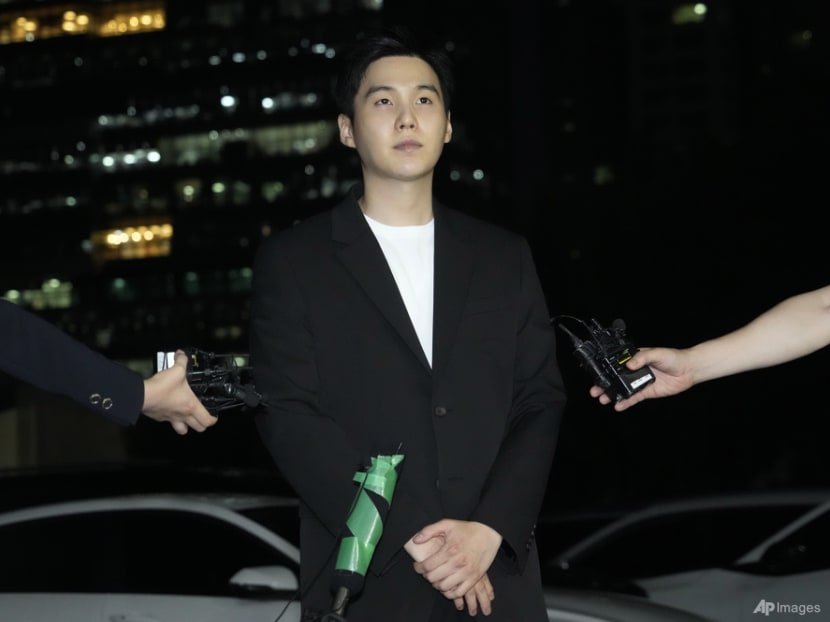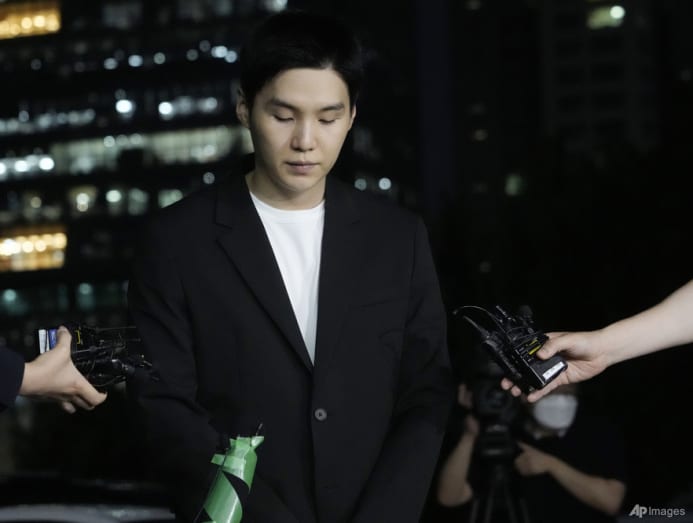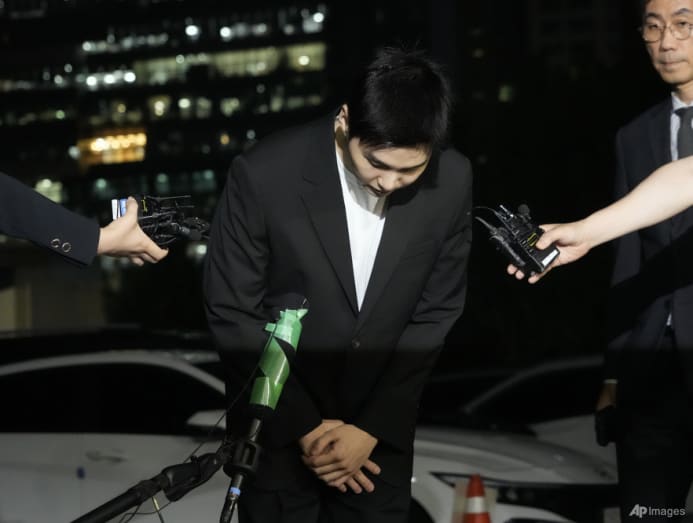Was BTS' Suga's US$11,000 drunk driving fine fair or too harsh? It depends on your perception of K-pop
While some fans have said Suga should leave BTS entirely after affecting their reputation, others have called the penalty overly hefty. CNA Lifestyle explains the possible main reason behind such differing perspectives.

K-pop band BTS member Suga arrives for questioning over allegations of driving an electric scooter after drinking at the Yongsan police station in Seoul on Aug 23, 2024. (Photo: AP Photo/Ahn Young-joon)

This audio is generated by an AI tool.
Despite its idols’ intended squeaky clean image, the K-pop industry has no lack of dirt, with a member from megagroup BTS the latest star to run afoul of the law. Suga was fined more than US$11,000 (S$14,090) for driving an electric scooter while drunk, reported South Korea’s Yonhap News Agency on Monday (Sep 30).
The 31-year-old, whose fine was almost the maximum possible, was found trying to get up after falling off his e-scooter by police late at night on Aug 6. His blood alcohol level was also measured to be nearly three times the legal limit, Yonhap reported.
The singer, currently performing mandatory military duties as a social service agent, has already had his driving licence revoked.
One could argue Suga's offence, in which no one was harmed, is way less serious than 2019’s Burning Sun scandal – K-pop’s most significant controversy in recent history. The scandal that involved former BigBang member Seungri led to several high-profile idols being exposed and prosecuted for various crimes, including prostitution, police bribery, as well as filming and distributing non-consensual intimate videos of women.

But divisive reactions from BTS fans – within and outside Korea – to Suga’s misdemeanour appear to paint the picture of a more grievous crime. To the camp which has expressed sympathy for the singer, the outrage expressed in equal fervour by the opposing side might seem disproportionate to the crime, but the divide is hardly unexpected.
In my view, it boils down to how K-pop idols and the broader forces that shape their career and social status are perceived.
In Korea, stars have to be worthy of idolisation – they are expected to be perfect, including off stage.
PERCEPTION OF K-POP IDOLS
Everyone knows that perception shapes expectation. You’d expect more from someone you perceive to be more capable, for instance.
In turn, these expectations shape the repercussions we believe a person deserves when they fail to meet said expectations. If you expected more from someone, you’d likely be more disappointed when they don’t deliver, and hence feel justified in doling out harsher punishment.
In the K-pop industry, perception starts from a single, innocuous word.
"While 'idol' is just a word in many countries, in Korea it has long meant a type of very visible celebrity where stars have to be worthy of idolisation – they are expected to be perfect, including off stage," CedarBough T Saeji, assistant professor of Korean and East Asian Studies at Pusan National University, told The Korea Times.

Unsurprisingly, Korean fans have expressed abject disappointment and dismay with Suga, with some even calling for him to leave BTS entirely.
While this view is extreme to some, it seems to come from the deep-seated Korean concept of chemyeon, described as an individual’s social face. Chemyeon, a collectivist ideology, requires individuals to be conscious of their behaviour towards others and the external evaluations they receive in return to maintain social order. And the consequences of losing chemyeon are often tangible, not merely a hit to an individual's perceived character.
In Korea, drunk driving is regarded as a serious crime, almost equivalent to premeditated murder, whereas that’s not always the case overseas.
PERCEPTION OF K-POP INDUSTRY, DRUNK DRIVING
On the other hand, international fans have rallied behind Suga, arguing that the man is only human and that he too makes mistakes.
Debates about whether such a stance is misplaced mercy or a reasonable middle ground miss the point, in my view. Such fans already have a different starting perception of the K-pop industry, excusing “lesser” crimes like Suga’s with greater leeway.
They often point to K-pop’s notoriously exacting standards for how idols should look and behave – rules that such fans believe largely result in idols having mental breakdowns and even taking their own lives – as a reason for their continued support.
Parasite actor Lee Sun-kyun, for example, was found dead in December last year in an apparent suicide amid drug allegations. Despite the A-list actor’s pleas of innocence, public opinion in Korea remained “unsympathetic”, The Korea Times reported.
In Suga’s case, moreover, the contrasting perceptions of drunk driving within and outside Korea added another layer of complexity to fan discourse. Chemyeon is after all also tied to morality – a key pillar contributing to social status.
“In Korea, drunk driving is regarded as a serious crime, almost equivalent to premeditated murder, whereas that’s not always the case overseas,” pop culture critic Jung Duk-hyun told The Korea Times.
Take NSYNC frontliner Justin Timberlake’s initial drunk driving accusations for comparison. It doesn’t appear to have dented his reputation (or ruined the tour).

In fact, Timberlake in mid-September was fined US$500 (S$649) and ordered to perform community service when he pleaded guilty to driving while ability impaired – a lesser traffic violation than driving while impaired, according to multiple media reports.
So perhaps the condemnation around Suga’s drunk driving offence is, really, less about the singer himself. Several other K-pop idols who’ve fallen from grace have been similarly slammed by fans and exiled from the industry.
Instead, I see such reactions as stemming from the strong and shared sense of shame of having a respected role model in society “lose face” and fall short of societal expectations in Korea.
A pedestal can be a prison after all, and the public rebuke is merely an expected, and even deserved, outcome for him having “violated” an unspoken social contract.
If not in reality, then certainly in perception.







